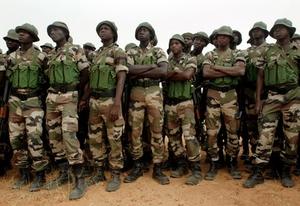African securityU.S. officials: Nigerian military too corrupt, inept to defeat Islamists, rescue girls
U.S. officials have been unusually frank – and unusually public — in their assessment of the competence and effectiveness of the Nigerian military. The officials presented their analysis last Thursday, when they were questioned by lawmakers about whether the Nigerian military was capable of rescuing – or even locating – the more than 260 girls abducted by Boko Haram last month. U.S. military and intelligence officials said that even with international help, the Nigerian military was too corrupt and too incompetent to play a meaningful role in rescuing the girls. “We’re now looking at a military force that’s, quite frankly, becoming afraid to even engage,” Alice Friend, the Pentagon’s principal director for African affairs, said of the Nigerian military. “The Nigerian military has the same challenges with corruption that every other institution in Nigeria does. Much of the funding that goes to the Nigerian military is skimmed off the top, if you will.” There is another obstacle to U.S. military help to Nigeria: Friend told lawmakers that finding Nigerian army units which have not been involved in gross violations of human rights has been a “persistent and very troubling limitation” on American efforts to work with the Nigerian military.

Nigerian airborne unit in 'formation' // Source: commons.wikimedia.org
At least 118 people were killed yesterday (Tuesday) in two explosions in the central Nigerian city of Jos. Officials said the death toll would likely climb higher.
“The death toll stands at 118. This is the number of victims recovered from the scene of the explosions, but we are still searching through the smoldering debris for more bodies,” said Mohammed Abdulsalam, coordinator for the National Emergency Management Agency in the city.
“The figure may rise when the search is over,” Abdulsalam said.
CNN reports that earlier, Plateau State Commissioner Chris Olakpe described the blasts as “terrorist activities,” but refused to speculate on who might be responsible.
President Goodluck Jonathan condemned the bombings as a “tragic assault on human freedom” and described those behind them as “cruel and evil.”
The first blast occurred in the business section in a predominantly Christian area of the city and left several cars burning. The second blast occurred when emergency personnel and on-lookers rushed to site of the first explosion. If the death toll keeps rising, it may reach Boko Haram’s single biggest atrocity yet, a multiple-bomb attack in Kano which killed 170 in January 2012.
Yesterday’s blasts offered more evidence to the deteriorating security situation in Nigeria, and the ineffectiveness of the Nigerian government and military in dealing with the increasingly more brazen attacks by the Islamist militants of Boko Haram.
U.S. officials have been unusually frank – and unusually public — in their assessment of the competence and effectiveness of the Nigerian military. The officials presented their analysis last Thursday, when they were questioned by lawmakers about whether the Nigerian military was capable of rescuing – or even locating – the more than 260 girls abducted by Boko Haram last month. U.S. military and intelligence officials said that even with international help, the Nigerian military was too corrupt and too incompetent to play a meaningful role in rescuing the girls.
Many U.S. lawmakers support an increased U.S. role in the effort to rescue the abducted girls – and, more generally, an increased U.S. role in helping to Nigerian authorities offer more effective security to the Nigerian people — but the Pentagon has let it be known that getting involved in Nigeria would be unacceptably risky.
“At this point, we’re not actively considering the deployment of U.S. forces to participate in a combined rescue mission,” the White House spokesman Jay Carney said last Wednesday.
